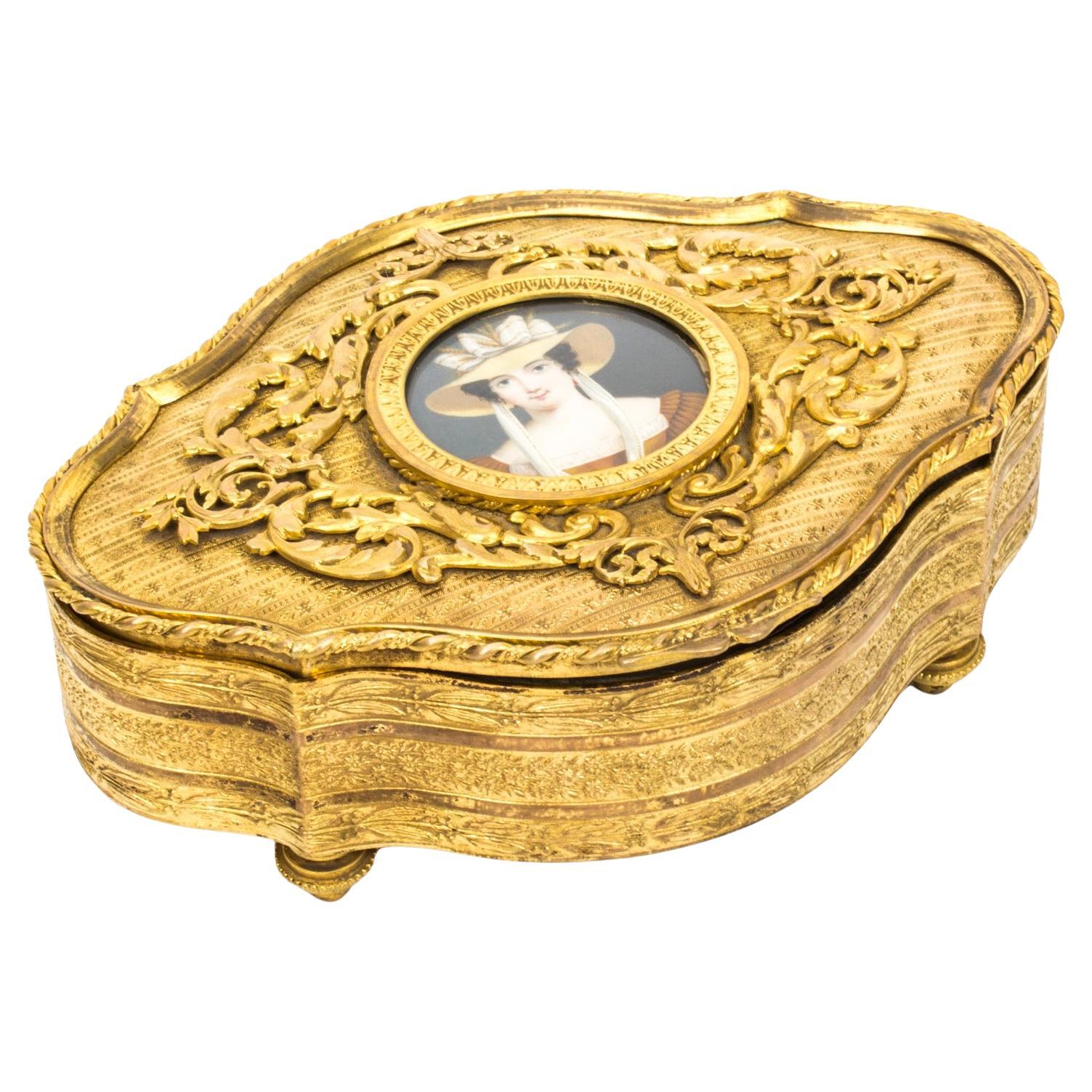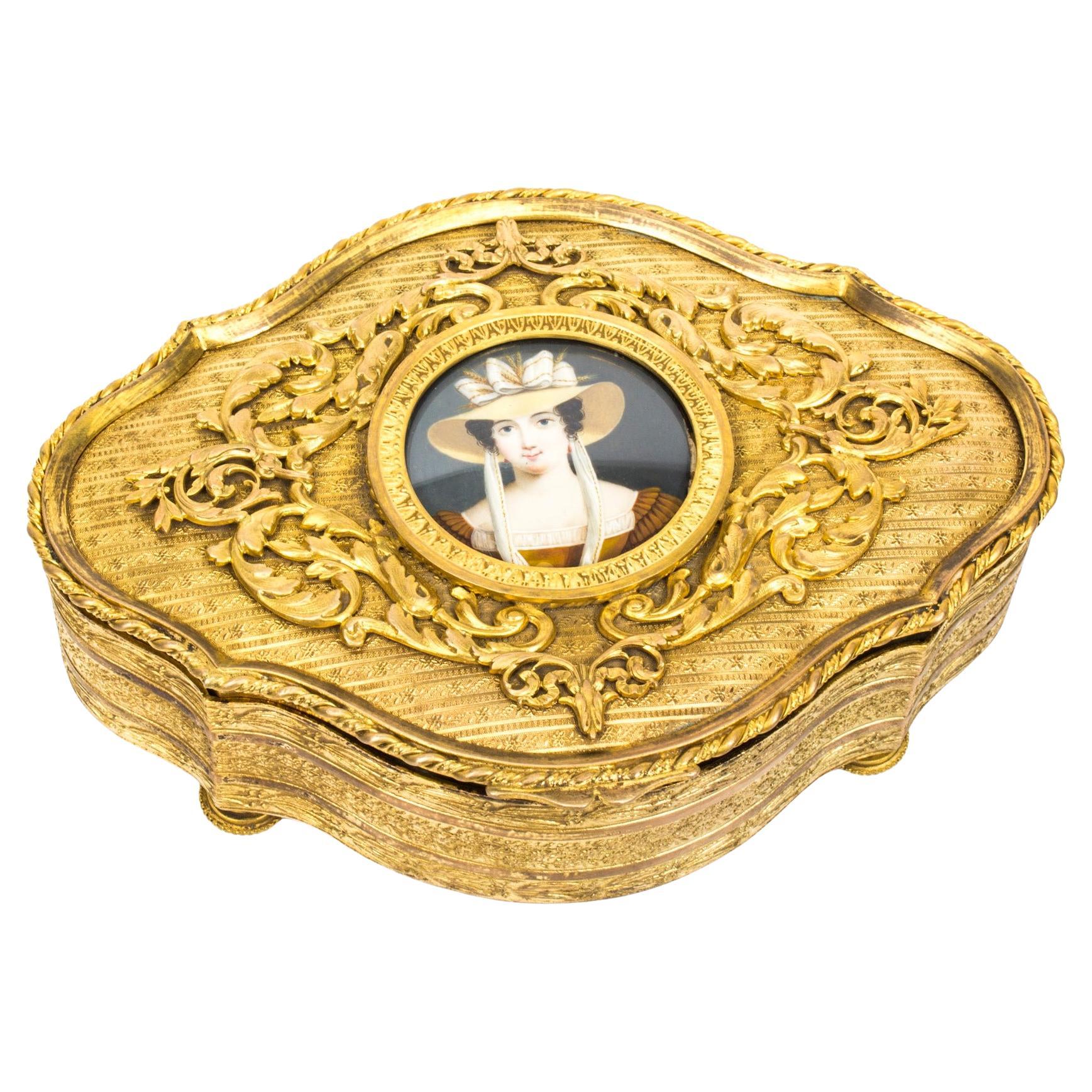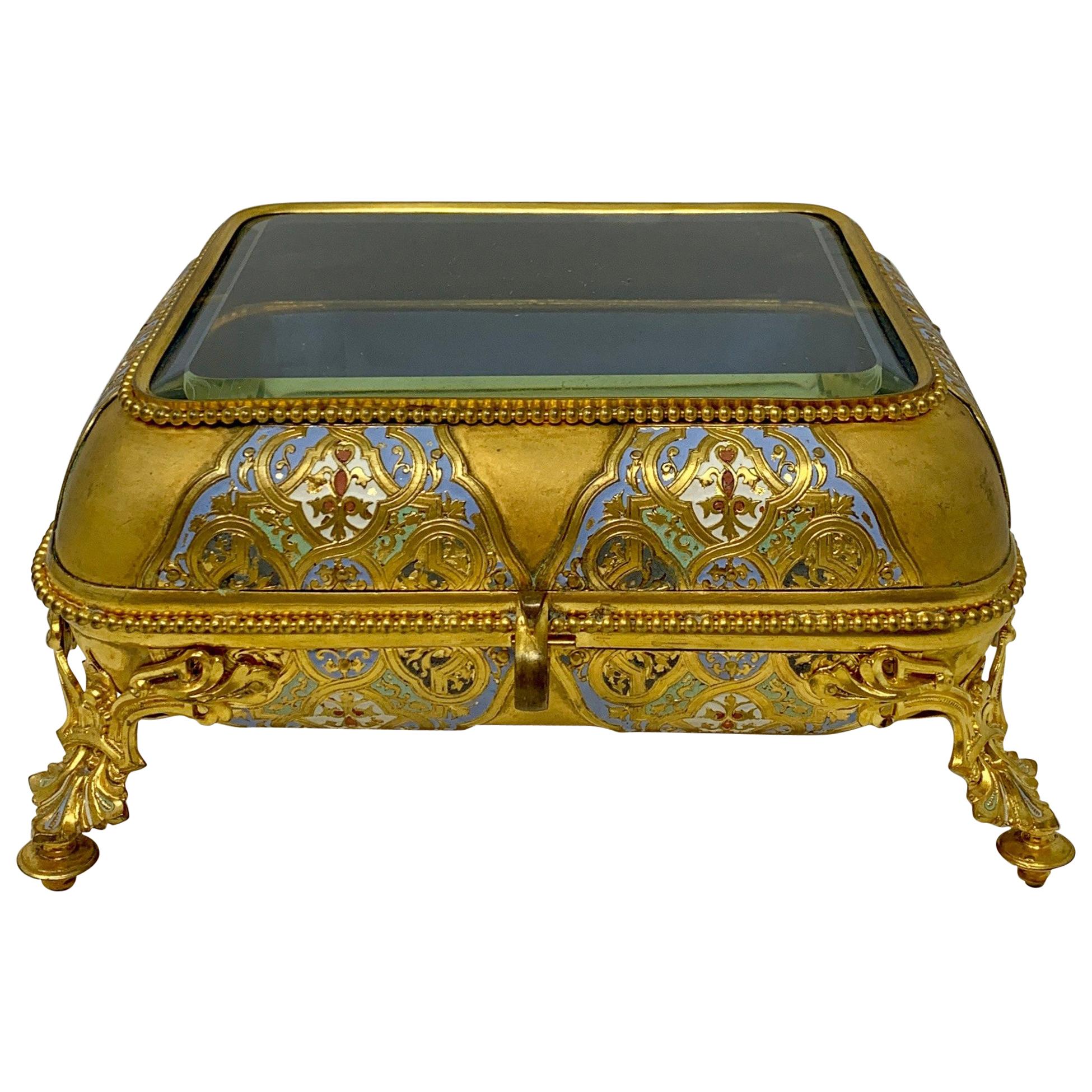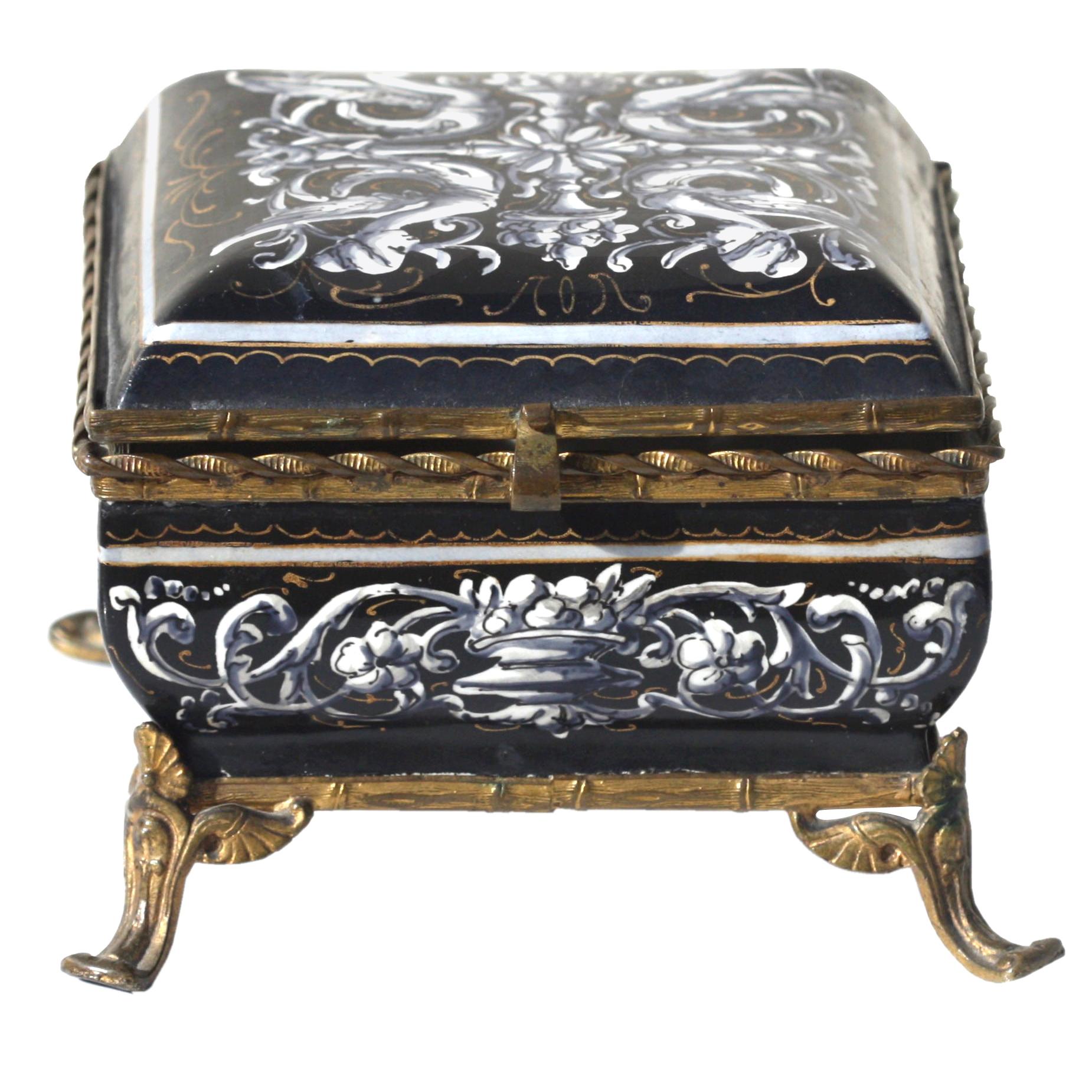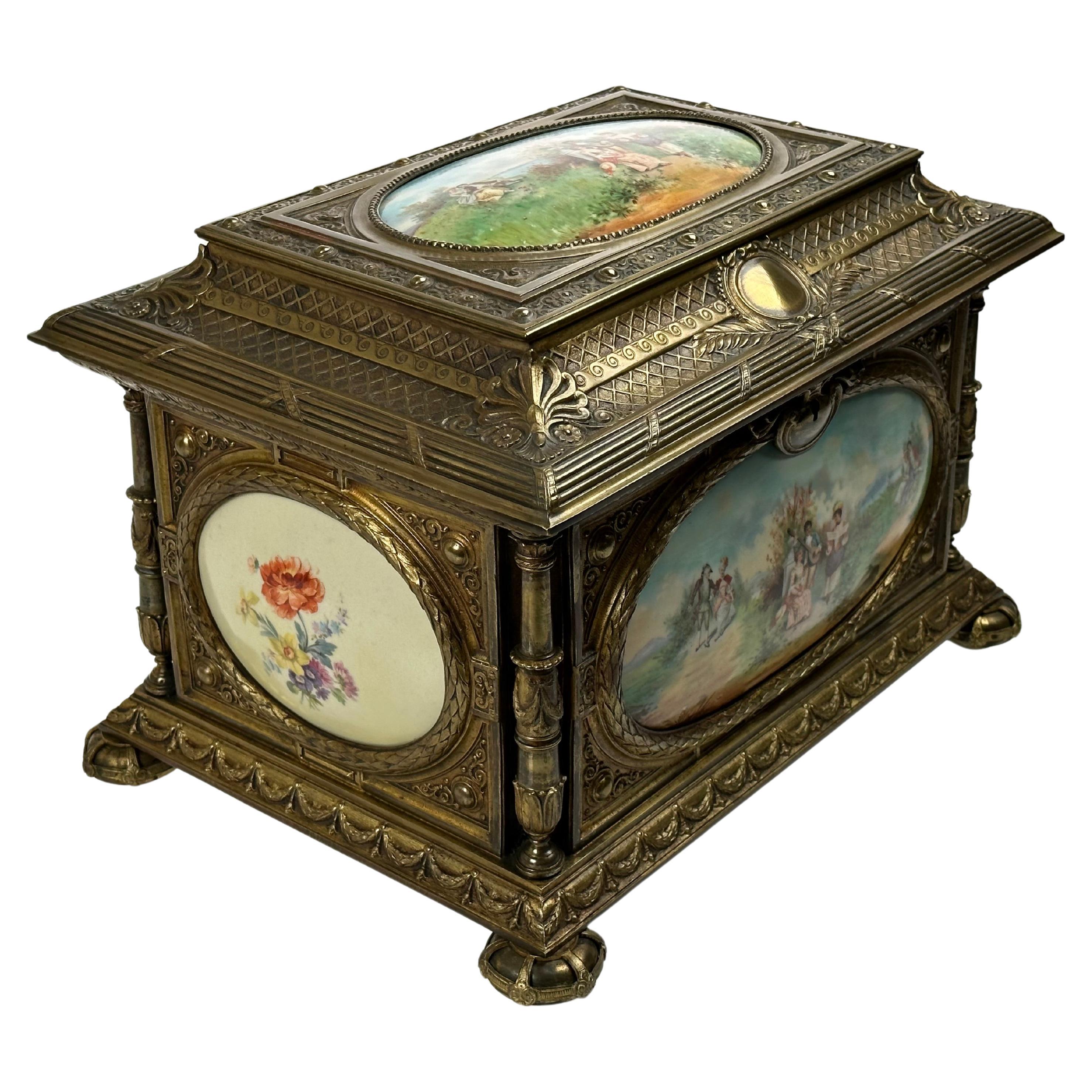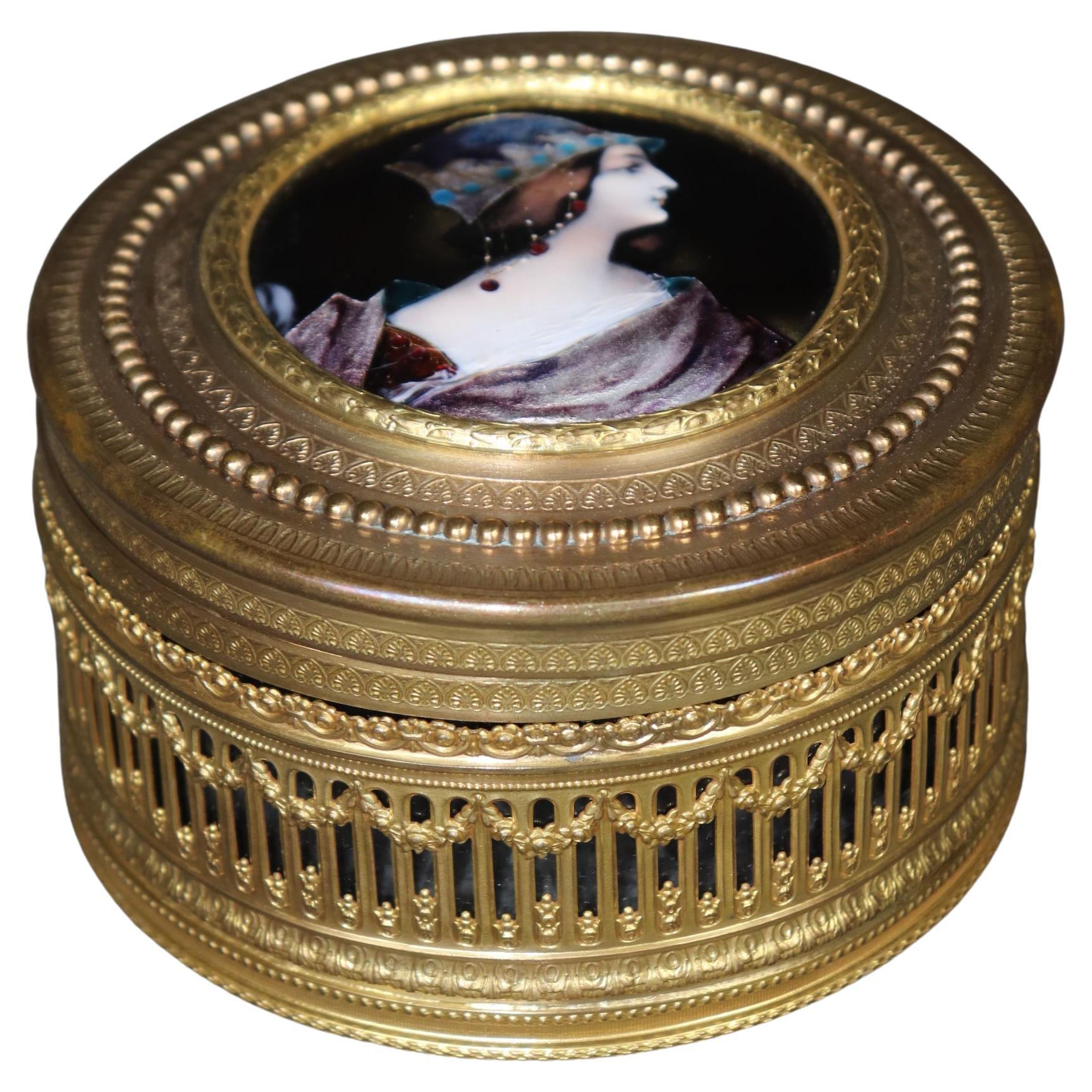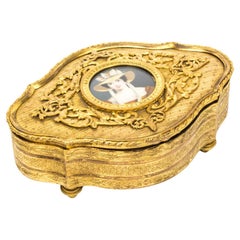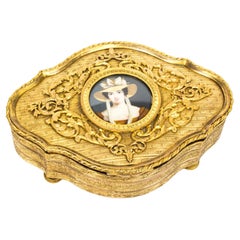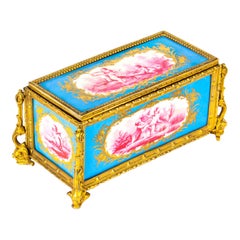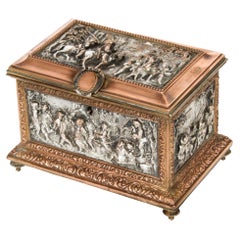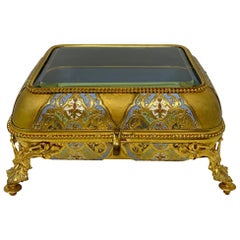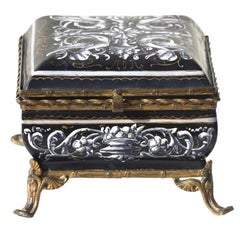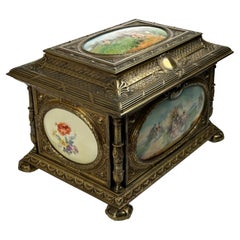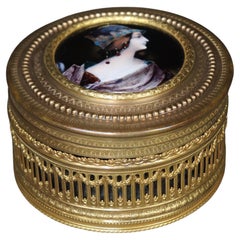Items Similar to Antique Gilt Bronze Jewellery Casket & Limoges Miniature 19th Century
Video Loading
Want more images or videos?
Request additional images or videos from the seller
1 of 20
Antique Gilt Bronze Jewellery Casket & Limoges Miniature 19th Century
$2,569.67
£1,900
€2,249.47
CA$3,552.79
A$3,979.72
CHF 2,090.29
MX$48,392.14
NOK 26,469.95
SEK 25,127.10
DKK 16,788.64
About the Item
This is a beautiful antique Napoleon III gilded ormolu and Limoges enamel jewellery casket, Circa 1870 in date.
The hinged lid having a beautiful finely painted miniature Limoges enamel portrait bust of a young lady, signed L.C., on an oval panel surrounded by striking red guilloche enamel. This very fine casket is painted in enamel, and hails from the great centre of Enamel Art of Limoges in France, it is signed L.C. for Levy Coblentz, (1828-1900), he is known for his high quality work.
The casket with filigree textured panels is decorated with acanthus leaf mounts and raised on lion paw feet, the lid opens to reveal an interior lined with the original padded floral patterned silk, making it ideal for the storage and display of precious jewellery or small objects.
It is a lovely piece which is functional as well as being highly decorative.
Condition:
In excellent condition, the enamel in perfect condition.
Dimensions in cm:
Height 23 cm x Width 19 cm x Depth 9 cm
Dimensions in inches:
Height 9 inches x Width 7 inches x Depth 3 inches
Limoges enamel
has been produced at Limoges, in south-western France, over several centuries up to the present. There are two periods when it was of European importance. From the 12th century to 1370 there was a large industry producing metal objects decorated in enamel using the champlevé technique, of which most of the survivals (estimated at around 7,500 pieces), and probably most of the original production, are religious objects such as reliquaries.
After a gap of a century, the industry revived in the late 15th century, now specializing in the technique of painted enamel, and within a few decades making rather more secular than religious pieces. In the French Renaissance it was the leading centre, with several dynastic workshops, who often signed or punchmarked their work Luxury pieces such as plates, plaques and ewers were painted with sophisticated Mannerist decoration of pictorial figure scenes which on vessels were surrounded by elaborate borders.
In both periods the largest pieces include narrative scenes. These exemplify the styles of their respective periods. In the medieval champlevé the action is simply and directly shown by a few figures, with patterned backgrounds. In the Mannerist painted pieces numerous figures and detailed backgrounds tend to overwhelm the activity of the main figures.
After a decline from about 1630, and later competition from porcelain, high-quality production revived in the mid-19th century, and adopted art nouveau and other contemporary styles, with a relatively small production.
Limoges enamel has been produced at Limoges, in south-western France, over several centuries up to the present. There are two periods when it was of European importance. From the 12th century to 1370 there was a large industry producing metal objects decorated in enamel using the champlevé technique, of which most of the survivals (estimated at around 7,500 pieces), and probably most of the original production, are religious objects such as reliquaries.
After a gap of a century, the industry revived in the late 15th century, now specializing in the technique of painted enamel, and within a few decades making rather more secular than religious pieces. In the French Renaissance it was the leading centre, with several dynastic workshops, who often signed or punchmarked their work Luxury pieces such as plates, plaques and ewers were painted with sophisticated Mannerist decoration of pictorial figure scenes which on vessels were surrounded by elaborate borders.
In both periods the largest pieces include narrative scenes. These exemplify the styles of their respective periods. In the medieval champlevé the action is simply and directly shown by a few figures, with patterned backgrounds. In the Mannerist painted pieces numerous figures and detailed backgrounds tend to overwhelm the activity of the main figures.
After a decline from about 1630, and later competition from porcelain, high-quality production revived in the mid-19th century, and adopted art nouveau and other contemporary styles, with a relatively small production.
Ormolu (from French 'or moulu', signifying ground or pounded gold) is an 18th-century English term for applying finely ground, high-carat gold in a mercury amalgam to an object of bronze.The mercury is driven off in a kiln leaving behind a gold-coloured veneer known as 'gilt bronze'.
The manufacture of true ormolu employs a process known as mercury-gilding or fire-gilding, in which a solution of nitrate of mercury is applied to a piece of copper, brass, or bronze, followed by the application of an amalgam of gold and mercury. The item was then exposed to extreme heat until the mercury burned off and the gold remained, adhered to the metal object.
Our reference: A4041
- Dimensions:Height: 9.06 in (23 cm)Width: 7.49 in (19 cm)Depth: 3.55 in (9 cm)
- Style:Napoleon III (In the Style Of)
- Materials and Techniques:
- Place of Origin:
- Period:
- Date of Manufacture:circa 1870
- Condition:
- Seller Location:London, GB
- Reference Number:Seller: A40411stDibs: LU950640779982
About the Seller
5.0
Platinum Seller
Premium sellers with a 4.7+ rating and 24-hour response times
Established in 1983
1stDibs seller since 2012
1,375 sales on 1stDibs
Typical response time: <1 hour
Associations
LAPADA - The Association of Arts & Antiques Dealers
- ShippingRetrieving quote...Shipping from: London, United Kingdom
- Return Policy
Authenticity Guarantee
In the unlikely event there’s an issue with an item’s authenticity, contact us within 1 year for a full refund. DetailsMoney-Back Guarantee
If your item is not as described, is damaged in transit, or does not arrive, contact us within 7 days for a full refund. Details24-Hour Cancellation
You have a 24-hour grace period in which to reconsider your purchase, with no questions asked.Vetted Professional Sellers
Our world-class sellers must adhere to strict standards for service and quality, maintaining the integrity of our listings.Price-Match Guarantee
If you find that a seller listed the same item for a lower price elsewhere, we’ll match it.Trusted Global Delivery
Our best-in-class carrier network provides specialized shipping options worldwide, including custom delivery.More From This Seller
View AllAntique Gilt Bronze Jewellery Casket & Miniature 19th Century
Located in London, GB
This is a beautiful antique gilded ormolu serpentine shaped jewellery casket, Circa 1870 in date.
The top, front, sides and back are beautifully cast and tooled in gilt bronze. The ...
Category
Antique 1870s Jewelry Boxes
Materials
Bronze
Antique Gilt Bronze Jewellery Casket & Miniature c.1870
Located in London, GB
This is a beautiful antique gilded ormolu serpentine shaped jewellery casket, Circa 1870 in date.
The top, front, sides and back are beautifully cast and tooled in gilt bronze. The ...
Category
Antique 1870s Jewelry Boxes
Materials
Bronze, Ormolu
Antique French Sevres Porcelain and Ormolu Jewelry Casket, 19th Century
Located in London, GB
This is a fabulous antique French Ormolu and Sevres Porcelain jewelry casket, circa 1870 in date.
This magnificent casket is rectangular in shape, with the top as well as each sid...
Category
Antique 1870s French Porcelain
Materials
Ormolu
Antique French Silvered & Gilt Jewellery Casket Box AB Paris 19th C
Located in London, GB
This is a beautiful Antique silvered and gilt on copper French jewellery casket, signed AB Paris and Circa 1880 in date.
Of rectangular form this wonderful casket is of very high quality and features the lid and sides decorated with relief cast scenic panels...
Category
Antique 1880s French Jewelry Boxes
Materials
Copper
Antique French Sevres Cobalt Blue Porcelain Jewellery Casket 19th Century
Located in London, GB
This is a fabulous antique French Sevres ormolu mounted cobalt blue soft paste porcelain jewellery casket, Circa 1870 in date.
The shaped hinged ormolu mounted cover is superbly de...
Category
Antique 1870s Decorative Boxes
Materials
Ormolu
Antique French Marquetry and Ormolu Stationary Casket . 19th Century
Located in London, GB
This is a wonderful antique French Gonçalo Alves marquetry and ormolu mounted casket, circa 1860 in date.
The casket of bureau form has a lift up top and is inlaid with a marquetry ...
Category
Antique 1860s Decorative Boxes
Materials
Ormolu
You May Also Like
Antique French Napoleon III Ormolu and Cloisonné Jewel Box
Located in New Orleans, LA
Antique French Napoleon III ormolu and cloisonné jewel box. Just a little charmer.
Category
Antique 19th Century French Jewelry Boxes
Materials
Ormolu
Continental Baroque Style Gilt Bronze Mounted Enamel Box Late 19th Century
Located in West Palm Beach, FL
Continental Baroque style gilt bronze mounted enamel box,
Late 19th century
The square hinged top decorated overall with mythical figures.
Measures: Height 3.5 in., 11.4cm (4 1/2"...
Category
Antique Late 19th Century Decorative Boxes
Materials
Enamel
A Large French Antique Sevres Style Porcelain & Gilt Bronze Box Casket
By Manufacture Nationale de Sèvres
Located in Los Angeles, CA
Adorned with five painted panels depicting delicate floral motifs and classical scenes, this piece showcases the hallmark elegance and artistry of Sevres porcelain.
Sevres porcelain...
Category
Antique Late 19th Century French Jewelry Boxes
Materials
Bronze
Antique French Louis XVI Style Crystal and Gilt Enameled Jewelry Casket Box
Located in Swedesboro, NJ
Dimensions - H: 3 1/4 in W: 5 1/4 in D: 5 1/4 in
This Antique 19th Century French Louis XVI Style Crystal and Gilt Enameled Jewelry Casket Box is truly remarkable and whispers tale...
Category
Antique 19th Century French Louis XVI Decorative Boxes
Materials
Crystal, Metal, Enamel, Ormolu
French 19th Century Empire Porcelain and Gilt Bronze Decorative Jewelry Box
Located in Firenze, IT
This French Empire 19th century rectangular porcelain dresser box or jewlery decorative casket has a wonderfully patinated powder blue/cerulean light blue background color and features grotesque masks, architectural vase, fruit, flowers and leafy scrolled design throughout painted as a trompe l’oeil in the round. Ormolu mounts enrich the whole box.
The paintings on this casket are striking as is the color palette used, a wonderful mix of light purple, cream, blue and soft brown.
The lid is centered by a grotesque mask inspired by antiquity. The front, back and sides are profusely decorated with architectural elements, cartouches and volutes. The design is centered by a vase with a fruit arrangement that appear to be plums. The decoration could refer to the allegory of autumn and the mask painted on the lid could refer to Bacchus.
Both the color of the porcelain and the paintings are very unusual and a sign of high quality and uniqueness.The box was most probably given to a high-ranking lady as a gift on the occasion of her marriage, or perhaps after the birth of a child.
The lidded box is fitted with ormolu mounts, hinges and clasp. A gilt bronze band finelly chiseled in the form of a rope adorns the upper part. The trinket box rests on four gilt bronze lion paw feet.
This striking French porcelain box...
Category
Antique 19th Century French Empire Jewelry Boxes
Materials
Bronze, Ormolu
Important Empire Period Paris Porcelain & Ormolu-Mounted Casket/Box/Jewelry Box
By Jean-Pierre Feuillet
Located in New York, NY
An Important and very rare Empire period Paris porcelain ormolu-mounted Empire rectangular shaped two-handled casket decorated and assembled by ...
Category
Antique 1810s French Empire Decorative Boxes
Materials
Bronze
More Ways To Browse
Bronze Jewellery
Red Antique Jewelry
French Jewelry 19th Century
Floral Jewelry Box
French Mid Century Jewelry
Antique Jewellery Display Boxes
Filigree Box
Antique Metal Jewelry Box
Antique South Jewellery
Antique Jewelry Enamel Box
Oval Antique Jewelry Box
Antique Jewelry Box Hinges
Copper Art Jewelry
Antique Gold Plated Jewellery
Enamel French Jewelry Boxes
Limoges Signed
Medieval Gold Jewlery
18th Century Decorative French Panels
